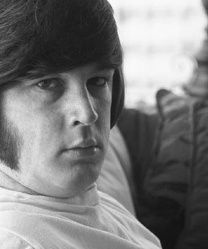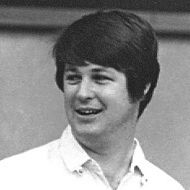|
..
Section One
Section Two
Section Three
 Within two
albums Wilson became the greatest pop helmsman of his time, composing,
arranging, orchestrating and producing timeless hits and teen anthems, and
the occasional song that hinted at some yearning deep within our shared
human experience. His absolute certainty that love was like the tide and
loneliness was unavoidable, and that the solitary confines of one’s own
room was where one sorted things out—these truths came as relief to the
sons of World War II veterans who knew the humbler abstracts of manhood
needed to be articulated in contrast to the clearer, more noble codes of
the warrior. Wilson’s off-road, off-surf, off-hit confessions were my
confessions; his doubts were my doubts. His own falsetto—the most
distinguishing feature and beauty of the Beach Boys unsurpassed harmonic
power—was out of range for most singers, and was often a source of
embarrassment for Wilson himself; but its sonority married power and
self-doubt and made us all want to hit that high note because it was this
note that reigned supreme and conjured in everlasting bittersweet
epiphanies whatever cry was buried inside us. Ask John Lennon, ask Roy
Orbison, ask Aimee Mann, ask Elvis Costello, ask k.d. lang—ask any singer
that matters, and they all marvel at the aching purity of Wilson’s voice. Within two
albums Wilson became the greatest pop helmsman of his time, composing,
arranging, orchestrating and producing timeless hits and teen anthems, and
the occasional song that hinted at some yearning deep within our shared
human experience. His absolute certainty that love was like the tide and
loneliness was unavoidable, and that the solitary confines of one’s own
room was where one sorted things out—these truths came as relief to the
sons of World War II veterans who knew the humbler abstracts of manhood
needed to be articulated in contrast to the clearer, more noble codes of
the warrior. Wilson’s off-road, off-surf, off-hit confessions were my
confessions; his doubts were my doubts. His own falsetto—the most
distinguishing feature and beauty of the Beach Boys unsurpassed harmonic
power—was out of range for most singers, and was often a source of
embarrassment for Wilson himself; but its sonority married power and
self-doubt and made us all want to hit that high note because it was this
note that reigned supreme and conjured in everlasting bittersweet
epiphanies whatever cry was buried inside us. Ask John Lennon, ask Roy
Orbison, ask Aimee Mann, ask Elvis Costello, ask k.d. lang—ask any singer
that matters, and they all marvel at the aching purity of Wilson’s voice.
The more control Brian Wilson had over his creation, the more
introspection he sought from himself and from the efforts of his band; the
more complex the emotion of the tune, the more the lyric needed to reflect
the arc of melancholy often suggested by the melody; the sadder and more
sublime the songs became, the more distance was placed between Wilson and
his band mates, his recording company, and the fans who did not want to
shower off the salt and leave the beach. Like the 60’s, it was time to get
serious. This never sits well with the brainless.
“I tried surf-bathing once, subsequently, but made a failure of it.
I got the board placed right, and at the right moment, too; but missed the
connection myself. The board struck the shore in three-quarters of a
second, without any cargo, and I struck the bottom about the same time,
with a couple of barrels of water in me”
(from Roughing
It by Mark Twain, 1872)
______________________________________
What good is the dawn that grows into day,
The sunset at night, or living this way?
For I have the warmth of the sun within me at night.
The love of my life, she left me one day,
I cried when she said, “I don’t feel the same way,”
Still, I have the warmth of the sun within me at night…
(“Warmth of the
Sun” by Brian Wilson & Mike Love, 1963)
______________________________________
When Brian Wilson sighs
All the angels will fall hard from the clouds
And a dumbstruck love will hold court*
With an empty shroud.
______________________________________
“Get behind the chords. The further behind the chords you get, the more
melodic you can be. Get behind meaning, concentrate more and put all your
eggs into the melody.”
(Brian Wilson)
When Vince Gill sang “The Warmth of the Sun” at a Radio City Musical Hall
gig celebrating the music of Brian Wilson, the majesty of his pure
falsetto was a force of beauty once possessed by Wilson himself; but the
song…it is the song that holds sway. Written in response to the events of
John F. Kennedy’s assassination and Brian breaking up with his girlfriend
that day, the emotion is not masking the sublime with the ridiculous. The
melody instructs us that loss of any kind is the loss of a thousand kinds,
and no event, however minor to the larger context, is invisible to the
heart. And the tears fall harder in “Don’t Worry, Baby,” a tune from the
same period. That “everything will turn out all right,” was on the mind of
every American while the caisson was carrying Camelot to Arlington. But
for Wilson, it was the effort made by the man to be comforted by the
woman. Whenever men yield to this, healing occurs; and despite the blood
and rage of the 60’s, hope was possible. Racial and gender equality could
be achieved, hate could take a back seat to love, and war could be
ended—at least for a while.
Will I dig the same things that turned me on as a kid?
Will I look back and say I wish I hadn’t done what I did?
Will I joke around and still take on the suckers,
When I grow up to be a man.
(“When I Grow
Up” by Brian Wilson & Mike Love, 1964)

When I was a kid, no one bothered to ask me to draw a picture of what my
adult years would look like. When Mike Love handed this lyric over to
Brian, Wilson must have thought, ‘What am I to do with this?’ But Brian
drew from his well of emotion and came up with a stunning tune that cannot
be performed by any other group, that effortlessly shifts keys four times
in the course of two minutes, that executes the famously full vocal
nuances and call-and-answer counter pointing in startlingly complex ways,
that uses a harpsichord which seems to almost genuflect to the idea of
growing old. And somehow, this absurdly orchestrated tune turns into a top
ten hit! It defies the very codes that defined a hit back then. Anchored
in a major key, the march into adulthood is assured; shifting to a minor
key, the swagger turns to doubt. This is a pop song whose reward is
immediate, but to fathom it requires a sustained reading of its
musicality. It is precisely at this point in his recording career when
Wilson’s concerns were no longer buried in metaphor, but were revealed
literally. Life’s inevitable movement from joy to sorrow can only be
tempered by acceptance, reflection and renewal. Even at the height of
Wilson’s considerable hit-making power, the Beach Boy who never surfed,
preferred to remain alone in his room with his piano, “bugged by his old
man,” and exhausted by the road. When Wilson retired from touring, what he
merely hinted at in production pieces like “Kiss Me, Baby,” “California
Girls,” “She’s Not the Little Girl I Once Knew,” and “In the Back of My
Mind,” was about to become fully realized in Pet Sounds.
Pet Sounds’ opening track wasted no time. “Wouldn’t It Be Nice”
completed the near hallucinatory yearning for requited love previously
explored in “Please Let Me Wonder,” which rendered the desire more through
the ache of its melody than through the sentiment of its lyric. It was as
if Wilson had shaped a thru-melody that made secondary the narrative
dynamic of a love song. Like most of the Beach Boys early canon, bliss
holds court over what we imagine happiness to be. The marriage sought in
this first track would be nice, but Wilson and newly hired lyricist, Tony
Asher, knew better. Pet Sounds ruptures the dream of bliss and
nearly finishes off the Beach Boys as a dependable, but uniquely
sophisticated hit making machine. Something of a higher lyrical and
musical ordering would be thrust upon a fan base that suspected that there
was more to this band than deuce coupes and thunder pipelines. When Jimi
Hendrix shouted from a cloud of rainbow noise and feedback on the Fillmore
stage that we would never have to hear surf music again, Brian was already
on it. The rest of the Beach Boys were coming off their first world tour
without Brian when they discovered that big brother was not only altering
the blueprint of their respective roles in the band, but the very
architecture of the way pop music would be produced. A few of the Boys
(and Capital Records) resisted, and the slight fissure—barely perceptible
in the finished Pet Sounds—eventually would tear apart the fabric of
Wilson’s magnum opus to American—his Smile.
“It has always been the foremost concern of genius to add to the sum of
mankind’s reverence for mankind”
(James Lord)
______________________________________
When Brian Wilson cries…
All the bass guitars will go out of tune—
Misfiring hot rod pistons fused in the pale high noon.*
______________________________________
“Each track has that lovely distinctive smothered Wilson sound as though
they’re all singing through sugar cotton wool. The whole LP is far more
romantic than the usual Beach Boy jollity. Sad little wistful songs about
lost love and found love and all around love”
(Penny
Valentine)
______________________________________
“No one is educated musically ‘til they’ve heard Pet Sounds…”
(Paul McCartney)
“Without Pet Sounds, Sgt. Pepper wouldn’t have happened”
(George Martin)
______________________________________
Every time I get the inspiration
To go change things around,
No one wants to help me look for places
Where new things might be found…
(“I Just Wasn’t
Made for These Times” by Brian Wilson & Tony Asher)
Pet Sounds is essentially about realms—the constructs of power and
place. In isolating himself from the need to provide the Beach Boys and
Capital Records with the formulaic fare of their usual “jollity,” Brian
Wilson, the very viceroy of the under produced pop hit, ascends to the
status of production king, lording over LA’s finest musicians to concoct a
song cycle that to this day resonates deeply with fans that gave this work
the listen it so deserves. It is almost alone among pop works that sounds
better and means more than it did on the thousand yesterdays of its life.
Pet Sounds separates out from infatuation the deeper tremors of
love and heartache. In its tuneful and orchestral symmetry and
unpredictable use of percussion, Pet Sounds allows the listener to
engage in listening: “Listen…listen…listen…, Wilson pleads in the gorgeous
“Don’t Cry (Put Your Head on My Shoulder)”… and let me hear your
heartbeat.”
NEXT SECTION
Section One
Section Two
Section Three
To learn more, visit the website at
http://www.brianwilson.com/
|